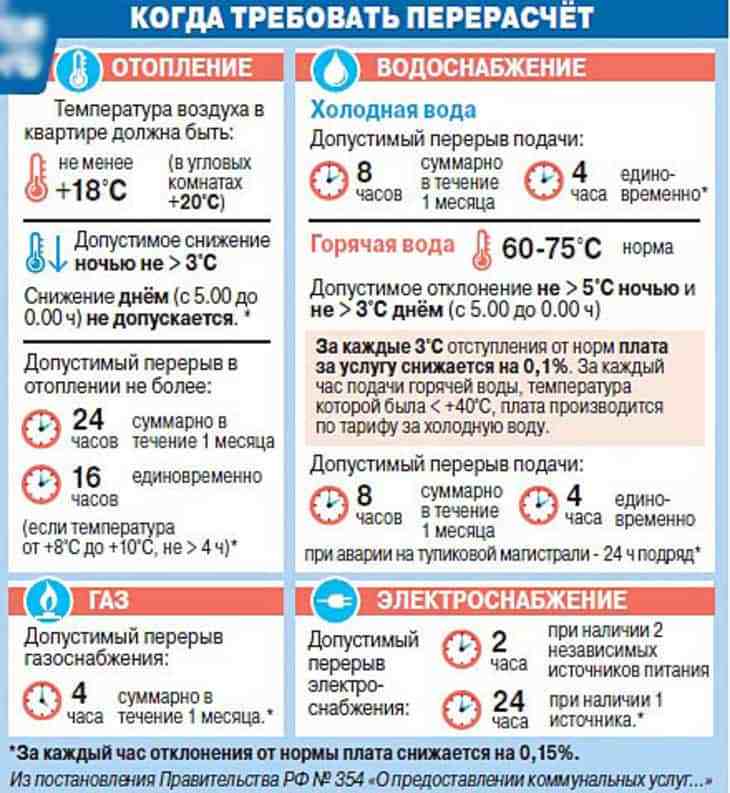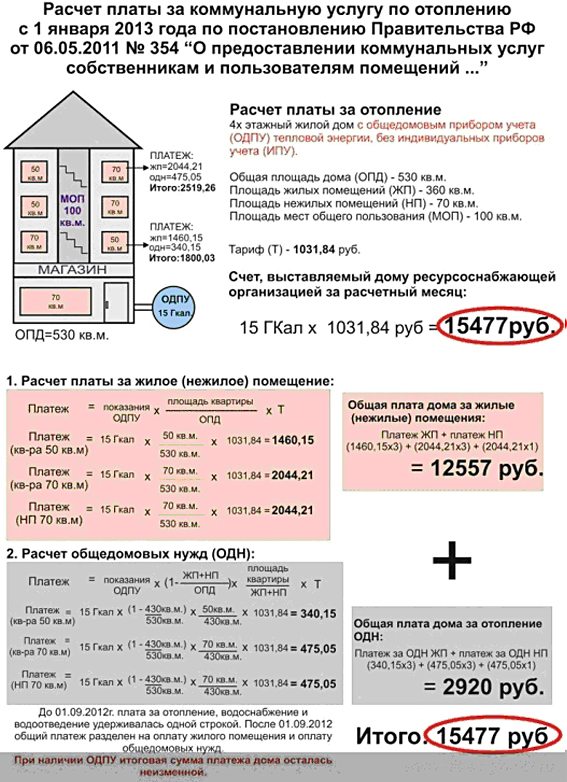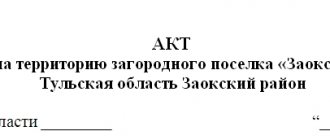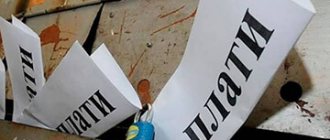Legal requirements for the procedure
The provision of housing and communal services to citizens is regulated by the Rules approved by Decree of the Government of the Russian Federation No. 354 of 05/06/2011. According to this document, the supplier may suspend or limit the provision of services after sending a preliminary notification to the debtor.
The consumer must be familiar with the warning 30 days before the expected sanctions.
The grounds for suspension of the service are considered to be:
- Non-payment within three months.
- Incomplete payment for the same period after receiving notification from the supplier.
- Violation of the debt repayment agreement concluded between the debtor and the supplier.
The same document states that, according to sanitary standards, it is prohibited to suspend the supply:
- cold water;
- heating;
- gas intended for heating;
- sewerage.
Without them, the premises automatically become unfit for habitation, therefore, the Housing Code of the Russian Federation is violated. A direct ban on turning off cold water and heating is contained in paragraph 307 of the Decree of the Government of the Russian Federation.
Utilities have the right to turn off:
- hot water;
- electricity;
- intercom;
- gas intended for cooking.
Procedure for turning off water for non-payment
Restriction of water supply to the defaulter is carried out in the following order:
- The debtor is sent a notice of the expected suspension of water supply if the debt is not paid within 30 days. The warning is delivered by registered mail or handed to the addressee against a signature (read more about the rules for drawing up various documents about turning off water here).
A properly drafted warning should contain the following points::- full name of the debtor;
residential address;
- account number;
- debt period;
- amount of debt;
- debt repayment date.
- If the debt is not repaid within the allotted time, the service provider will limit it, if such a technical possibility exists. The management company is obliged to additionally warn the consumer 3 days before the proposed actions.
- The utility supply restriction is in effect for 30 days . If the debtor does not take action to pay the debt within the allotted time, the utility service is turned off.
- Suspension of water supply does not mean that the debtor may not pay the resulting debt. The supplier has the right to recover funds through the court.
Warning about turning off water for non-payment, sample
Heat shutdown procedure
The consumption of resources is carried out on a paid basis in accordance with the agreement between the RSO and the owner of the residential premises. If one of the parties fails to fulfill the terms of the agreement, the victim has the right to initiate restoration of violated interests.
If there are no payments for two months in a row, the company has the authority to go to court to enforce debt collection. Turning off the heating during the heating season is illegal. Moreover, the organization is obliged to comply with the procedure established in PP No. 354.
The procedure for RSO when turning off the heating

When can housing and communal services debts be written off?
Heat shutdowns must have legal grounds and be carried out within the framework of approved regulations. If there is a debt, the supplier sends a notice to the consumer about the arrears and the need for payment. Notification occurs 20 days in advance, after which there will be a restriction on the supply of heat, namely a decrease in the temperature of the water in the radiators (see paragraph 119, paragraph a) of PP 354).
The notice is handed to the defaulter against receipt or transmitted by Russian Post. Typically, suppliers include such a message on the payment receipt.
Notification of a citizen about the presence of a debt is allowed by calling, SMS, or through a personal account. In other words, in any way through which it is possible to confirm receipt of information by the owner.
Within 20 days after sending the notice, restrictions on heating radiators will apply. After 10 days, RSO has the right to disconnect the service (see paragraph 119 paragraph c) PP 354).
Please note: the resumption of heating supplies occurs 48 hours after payment of the debt or settlement of the situation with RSO by another method. For example, obtaining a decision on installment plans or deferred payments.
Drawing up a certificate of disconnection from central heating
Refusal from central heating is carried out by RSO employees with the drawing up of a corresponding act.
The document contains the following information:
- date of work;
- a complete personal form of the owner of the premises, including address and personal account;
- indication of the method of de-energizing;
- information from domestic hot water metering devices – No. and readings;
- grounds;
- period.
The paper is prepared in three copies, one of which remains with the owner of the apartment.
Certificate of disconnection from central heating - sample.
Can the heating be turned off in one apartment?
Turning off the heating for non-payment in one apartment is fraught with difficulties. There is a risk that other residents of the apartment building may encounter incorrect operation of the system. In this case, a failure occurs in the hydraulic network, leading to a disruption in heat distribution.
For the period from 2017-2020. Russian citizens have increasingly begun to consider the option of abandoning the central heating system. Similar procedures are already carried out, but legally, which requires going through a complex process. Actions to switch to an autonomous heat supply are not allowed in all cases.
How is it done?
Restriction or suspension of the supply of utility services is possible only if these actions do not cause inconvenience to other owners of the premises and do not create a threat of harm to the common property of the apartment building.
Turning off hot water for non-payment in a separate apartment is carried out by shutting off or welding the pipes . Often, defaulting owners try to prevent utility workers from allowing them into the apartment. But such a position can lead to additional expenses.
Non-payers can install a plug on the water supply pipe from the basement of the apartment building using a special device. This manipulation is carried out for a certain cost, which managers also collect from the debtor.
As a result, the owner will have to pay the arrears in utility payments, late fees, and the cost of installing and subsequently removing the plug from the pipe.
IMPORTANT .
Non-payment within 3 months must be in full. If during the specified period the owner of the premises paid at least one ruble for water supply, disconnection for debts will be considered illegal.
Legal regulation on turning off heating
In the Russian Federation, the economic situation has developed in such a way that some people cannot pay their housing and communal services bills on time. Cutting off the heat supply, especially during the heating season, is a very terrible consequence, but the legality of such measures is questionable. In view of this, at the legislative level, official explanations were given when it is possible to stop the supply of heat and situations in which such measures are prohibited.
In addition, the law provides for requirements for the quality of heating services provided, which are presented in Section. VI Appendix No. 1 PP 354, namely:
- Uninterrupted heat supply during the heating season.
- Ensuring the temperature in residential premises is not lower than 18 degrees.
- System pressure requirements.
Laws of the Russian Federation on the supply of utilities
In the process of suspending or turning off heat, RSOs rely on PP No. 354 of 2011 (new edition 2021). The regulatory legal act regulates the relationship between management companies, homeowners' associations, RSOs and premises owners.
Chapter No. 11 of the resolution describes the regulations for stopping and terminating the supply of services, as well as situations in which such measures are unauthorized:
- clause No. 117 indicates cases in which the supplier is obliged to send notice of the upcoming procedure;
- paragraph No. 115 establishes the circumstances when such measures are carried out without warning;
- paragraphs 119-121 describe the notification process when the heating is turned off - compliance with the rules is mandatory.
Additionally, the Supreme Court of Russia, in Resolution of the Plenum of the Supreme Court No. 22, notes that the presence of arrears for utility services cannot be regarded as a basis for suspending the supply of water, electricity and gas.
Watch the video: “How not to pay for heat and what it can cost.” Turning off the heat is allowed under certain circumstances:
- Disabling a resource must be in accordance with a proportionate violation. For example, if the arrears amount to 450 rubles, then it is prohibited to stop the heat supply. This is due to the fact that such measures reduce the comfort of using the property.
- De-energizing an apartment or non-residential premises is allowed only in cases where other methods of influencing a person have failed. For example, the management company is obliged to send a notice of the need to repay the debt, offer an installment plan or another option for resolving the problem. If the owner refuses or ignores, then a heat shutdown is initiated.
- Suspension of the resource supply should not affect the health and life of third parties. That is, when family members live in the apartment, including children, elderly parents, etc., turning off the heating can pose a threat to these citizens.
If housing and communal services debt arises, property owners should not be afraid of interruption of heat supply. The management organization must make a proposal for a peaceful resolution of the conflict - deferment or installment payments.
At the same time, the owner of the apartment has the right to insist that radical measures to disconnect a life-supporting resource can harm the life and health of the persons living there, for which liability is provided under Art. 215.1, 215.2, 125 of the Criminal Code of the Russian Federation.
Reasons for turning off heating
Circumstances in which it is permissible to stop supplying heat without prior notice include:
- accidents on the highway;
- Emergencies and natural disasters;
- establishing the fact of independent, i.e. illegal, connection to the system;
- instructions from government agencies or municipalities;
- use in everyday life of tools and devices with power exceeding permissible values.
There are two grounds for written notification of an upcoming heating shutdown:
- Non-payment of bills for a period of more than 2 months based on consumption standards and tariff schedule. It is noteworthy that a similar situation concerns the lack of payments according to the established installment or deferment schedule.
- Carrying out scheduled repairs to maintain utility networks.
Legality of turning off heat for non-payment without a court decision and permissible periods of delay in payment

When to request recalculation for heat supply.
Thermal energy is the only resource from which a residential premises cannot be disconnected even if there is debt. The prescription is specified in paragraph No. 110 of PP No. 354. The company servicing the apartment building has the right to apply to the judicial authorities for forced collection of arrears.
However, cutting off power to an apartment in an apartment building or private building is not allowed. A similar rule applies to turning off electricity if there is a debt for heat. A separate procedure has been established for stopping the supply of cold water. The legislation of the Russian Federation allows de-energizing the supply of cold water in private homes, but not in apartment buildings.
Note: there is a ban on the termination of thermal energy, but there are no provisions on its limitation. That is, reduce those. heating supply parameters are allowed, including in winter.
The utility consumer is responsible for paying receipts no later than the 10th of the next month. In the absence of payments and accumulation of debt for 3 months. The RSO and the Criminal Code have the right to initiate legal proceedings. If the heat is turned off during legal proceedings, the defendant may file a counterclaim for violation of the law.
Legality and responsibility for shutdowns of heat supply during the heating season
If the RSO or the management company decide to turn off the heating in the apartment building during the heating season, then for such actions they face fines.
In this case, consumers who have made an unauthorized connection to the network are held accountable:
- according to Art. 7.23 of the Code of Administrative Offenses of the Russian Federation faces a fine of up to 10,000 rubles for an organization, and 1,000 rubles for officials;
- according to Art. 330 of the Criminal Code of Russia is charged with arbitrariness with the imposition of sanctions of up to 200,000 rubles.
Note: PP No. 1498 establishes additions and clarifications to the issue of maintaining the common property of apartment buildings and the provision of utility resources.
Actions of the debtor in case of illegal disconnection
If a citizen believes that the water supply was turned off by suppliers illegally, he must act as follows:
- Send a written application to the management company with a request to restore the water supply and recalculate for the period of shutdown.
- If water does not appear in the apartment within three days, a claim is filed to be sent to Rospotrebnadzor and the Prosecutor's Office. A copy of the statement sent to the management company is attached to the claim.
The owner of the premises may also file a claim in court.
The claim is accompanied by photos and videos confirming the lack of utilities in the apartment, as well as witness statements.
Effective evidence is an inspection report drawn up in the presence of two witnesses.
You can find out more about where to complain about illegal shutdown of hot water and heating here.
Is it legal to turn off the lights without a court order?
If the consumer has not paid for the electricity provided for two months, the management company has the right to send a warning to the debtor. If payment is not received, the company can suspend the supply of electricity without a court order. But this should be done only in compliance with all the necessary requirements of the law, otherwise the actions of the Criminal Code may be challenged in court.
The reason for going to court can only be a violation of the power outage procedure, namely, failure to comply with all the stages provided for by the established Rules, but not the fact of the outage itself.
So, if, in compliance with the procedure, company representatives turned off the electricity for debts, whether there are minors in the apartment or not, no longer matters. The actions of the Criminal Code are not grounds for going to court.
A power outage is considered legal if the following conditions are met:
- the debt period is equal to or exceeds 3 months, if payments correspond to average monthly consumption standards;
- the utility service provider notified the violator of the existence of the debt in writing, personally delivered, as well as in other ways to confirm the fact of receipt of the notification;
- the debtor is given 20 days from the date of receipt of the notification, during which he can repay the debt at least partially;
- after the allotted period has passed and the resident makes no attempts to pay the bills, he is sent a second warning, which contains information that the electricity will be turned off in 3 days.
The same applies to the question of whether the management company has the right to turn off water for debts. If the water is hot, then the management company can do this following the same steps.
How to make a claim and complaint?
There are no unified forms for drawing up claims and complaints, so they are drawn up according to the general rules for drawing up business papers:
- The management company's claim is drawn up in the name of its director. The document contains the following points:
- name of company;
personal data of the applicant (full name, address, contacts);
- the essence of the claim with references to the norms of law. In this paragraph, it is necessary to indicate the illegality of disconnection due to lack of notification or partial payment;
- the requirement to restore the supply of utility services within a specific time frame and recalculate payments for the period of shutdown;
- date and signature.
- A complaint to the Housing Inspectorate or the Prosecutor's Office is filed after receiving a negative response from the Criminal Code or when the consumer's requirements are completely ignored. It is drawn up in the name of the head of the organization and includes items:
- name of company;
personal data of the applicant;
- description of the circumstances of the case indicating the fact of illegal water shutoff. This paragraph describes filing a claim with the Criminal Code and reports the content of the organization’s response;
- please evaluate the actions of the management company’s employees;
- date and signature.
- A statement of claim is filed in court after receiving a response from the regulatory authorities. provided that the problem has not been solved or if it is possible to prove the moral damage caused by the shutdown. Such cases are within the jurisdiction of district courts, so you need to contact this organization.
The document is drawn up according to general rules and includes points:- name of the judicial authority;
plaintiff's details: full name, residential address, telephone number;
- details of the defendant: full name of the management company, full name of the director, legal address, telephone number;
- statement of claims. This paragraph describes the circumstances of turning off the water supply, the date of filing a claim with the Criminal Code and the content of the response. You can also describe the circumstances of contacting regulatory authorities. Your own claims must be supported by references to the violated norms of the law;
- We request that it be illegal to turn off the water supply based on current legislation.
The claim must be accompanied by a receipt for payment of the invoice (if available).
Sample complaint from the management company about turning off hot water.
Attached to the complaint is a copy of the complaint sent to the Criminal Code and the response received from it.
Attached to the statement of claim are copies of the claim to the Criminal Code and the complaint to the regulatory authorities, as well as the responses received from these organizations.
IMPORTANT . The outcome of the case when going to court directly depends on the correctness of the statement of claim. Therefore, it is more advisable to seek help in its preparation from a qualified lawyer.
Debt collection for heating
Debt collection for housing and communal services is an integral part of the work of management companies, HOAs and RSOs. However, it is difficult to understand the nuances of the procedure on your own. Management companies, before using radical measures to turn off heating, are required to comply with the pre-trial format for resolving the dispute.
First of all, a notice of the presence of arrears is sent - as a rule, the text is indicated on the payment receipt. If there is no payment from the owner, a claim is filed.
In addition to the required details, the text of the document contains the following information:
- legal grounds for claims;
- legal consequences in the form of accrual of penalties in accordance with Article No. 155 of Part No. 14 of the Housing Code of Russia.
In this case, the debtor can react in different ways - ignoring, counterclaiming, complaining about the absence of batteries in the apartment, etc. In each situation, experts recommend consulting with a lawyer about the legality of the requirements of the Criminal Code or RSO.
But if the claim is legitimate, then the debt should be paid in order to avoid litigation, since by decision of the authorities the company has the right to forcibly collect the arrears.
Statute of limitations

An example of calculating heating fees according to PP 354.
When a debt collector goes to court against an apartment owner with a debt, he must comply with the limitation period. This period is 3 years from the date of the last payment. In this case, for each payment the time is calculated separately. If the plaintiff misses the specified period, the defendant has the right to file a petition to apply the statute of limitations.
Collection of heating arrears from pensioners and orphans
The Russian Housing Code does not provide for exemption from utility bills for pensioners and orphans. Article No. 155, clause No. 11 of the Housing Code also establishes that non-use of an apartment is not grounds for non-payment of bills. Elderly persons have the right to apply to social authorities to receive benefits in the amount of 50% of the amount of receipts for housing and communal services.
On 04/06/19, Russian Government Order No. 656-r came into force, which, along with Federal Law No. 48, regulates that representatives of orphans are obliged to take steps to preserve the housing of the ward. Thus, the guardian must take care of the child’s property and prevent its value from decreasing.
Additionally, a representative of a minor has the right to facilitate the extraction of profit from such property. Consequently, payment for heating and other utilities is carried out at the expense of the child’s income. Debt collection proceeds in the standard manner.
Responsibility of the management company for illegal disconnection
The law provides for liability of suppliers for illegally turning off water:
- Administrative liability - a fine of 500 to 1,000 rubles for officials and from 5,000 to 10,000 rubles for legal entities.
This measure is applied by regulatory authorities if violations are established (Article 19.1 of the Code of Administrative Offenses). - Criminal liability is established by the court in the event of material or moral harm being caused to the owner.
The act carries a fine of up to 200,000 rubles and imprisonment of up to 3 years.If a person’s death occurs as a result of illegal actions, imprisonment is possible for up to 5 years. In addition, a ban is imposed on the right to hold leadership positions for three years.
- Arbitrariness is punishable by a fine of 80 thousand rubles (or in the amount of six months' salary) or forced labor for up to 200 hours.
If there are threats against the debtor, arrest for up to six months is applied. In exceptional cases, the court increases the term to 5 years (Article 330.215 of the Criminal Code).
If the disconnection is declared illegal due to lack of notification, the debtor receives a paper and is given a 30-day period to repay the debt. You will have to pay the bills anyway.
The illegally turned off water supply must be restored within three days, and payments must be recalculated.
Methods for filing a claim with the Criminal Code and response deadlines
A claim to the management company for illegal shutdown of water supply can be submitted to the responsible employee or sent to the organization by registered mail with notification. When submitted in person, the claim is drawn up in two copies . The receiving employee must sign and date the copy remaining with the applicant.
A response from the management company must be received within 10 days from the date of receipt of the claim. A response to a complaint to Rospotrebnadzor, the Housing Inspectorate or the prosecutor's office must follow within 30 days. If organizations violate the deadlines for taking measures, the consumer should file a claim in court.
The consumer is obliged to pay for the services provided to him in a timely manner and in the proper amount, so that the management company does not have grounds for turning off their water. If managers exceed their authority and turn off the water illegally, it is worth calling them to account and restoring their own consumer rights.








